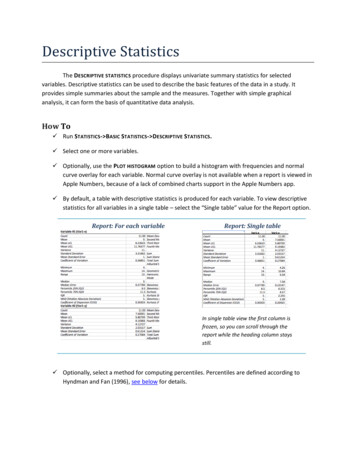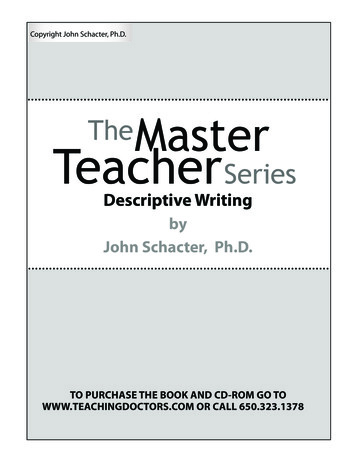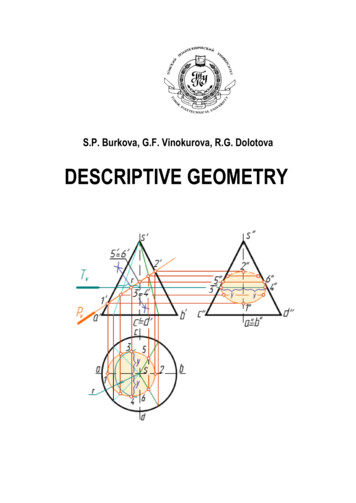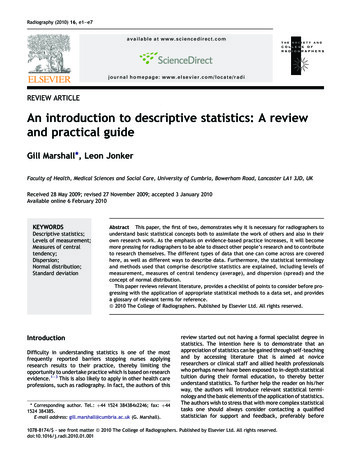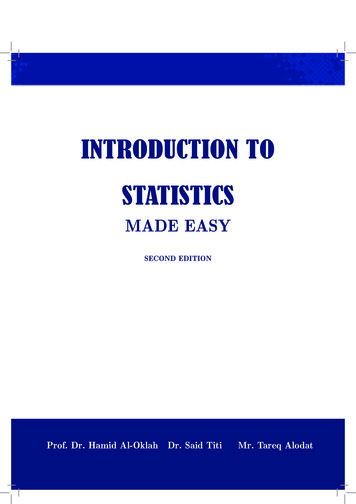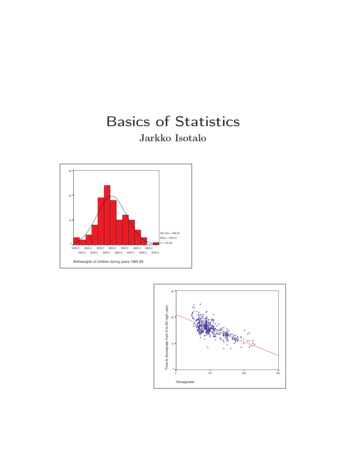
Transcription
A DESCRIPTIVE STUDY OF THE INTELLIGENCE COMMUNITY IN THEUNITED STATES OF AMERICAHursit Ucak, B.A.Thesis Prepared for the Degree ofMASTER OF SCIENCEUNIVERSITY OF NORTH TEXASMay 2003APPROVED:Robert W. Taylor, Major Professor and Chair ofthe Department of Criminal JusticeTory J. Caeti, Committee MemberD. Kall Loper, Committee MemberDavid Hartman, Dean of the School of CommunityServiceC. Neal Tate, Dean of the Robert B. ToulouseSchool of Graduate Studies
Ucak, Hursit, A Descriptive Study of the Intelligence Community in the United States ofAmerica. Master of Science (Criminal Justice), May 2003, 109 pp., 2 illustrations,references, 83 titles.This treatise represents a descriptive study of the intelligence community in the UnitedStates. It explores the ramifications of terrorism on the intelligence function, postSeptember 11, 2001. In-depth discussions concerning the structure of the U.S.intelligence community are presented as well as a focus on the defined steps of theintelligence process: planning and directions, collection, analysis, production, anddissemination. The final aspect of this study poses questions and issues relating to therestructuring of the U.S. intelligence community in light of the Homeland Security Act of2002.
TABLE OF CONTENTSChapterPage1. INTRODUCTION .1Research purposeLimitationsMethodologyOverview of forthcoming chapters2. STRUCTURE OF U.S. INTELLIGENCE AND INTELLIGENCE PROCESS.13Definition and purpose of intelligenceStructure of the U.S. intelligence communityTypes of Intelligence in the U.S. Intelligence Community3. INTELLIGENCE ANALYSIS AND PRODUCTION.33Intelligence AnalysisIntelligence DisseminationWarning IntelligenceAn Example of Intelligence Analysis4. SELECTED ISSUES OF INTEREST .49Issues about Homeland SecurityConclusion5. CONCLUSIVE REMARKS.89APPENDICES .97REFERENCE LIST . 101ii
LIST OF FIGURESFigurePage1. Intelligence Cycle .262. Association Chart . .98iii
CHAPTER 1INTRODUCTIONIf we in intelligence were one day given three wishes, they would be to knoweverything, to be believed when we spoke, and in such a way to exercise an influence tothe good in the matter of policy.Sherman KentSince the early days of civilization intelligence has played an important role inmany aspects of nations that it became a general saying “to be forewarned is to beforearmed.” It is impossible to determine when or how spying began, as there is norecord of any ancient conflict in which spies were not used (Mahoney & Mahoney,1998). Throughout history, kingdoms have been both created and overthrown by spies.Unpopular leaders have used spies to remain in power and saviors have led nations andpeoples to new centuries through the work of spies. Therefore, it can be assumed thatspying probably developed from a cave man’s first secret observation of a neighboringtribe. Of course, this was a modest beginning for a business that today uses verycomplicated electronic marvels (Mauer, Tunstall & Keagle, 1985; Mahoney & Mahoney,1998).The profession of intelligence has become more structured in recent years. Thereare more than forty American colleges and universities now offer courses in espionology(the study of intelligence) ranging from “Espionage in the Ancient World,” taught at theGeorgetown University through “Espionage and History” at the University of NewHampshire, to Yale University’s “Intelligence and Covert Operations”(O’tole, 1988).1
Furthermore, today there are several private organizations dedicated to the advance ofespionology. The National Intelligence Study Center, The Consortium for The Study ofIntelligence, and the Hale Foundation are only a few examples of this kind. All of theseinstitutions encourage and sponsor the study of intelligence and the teaching ofespionology in colleges and universities, and work to improve public understanding ofthe role of intelligence in national security. There are even some university programs thatprepare people to go directly into a training program within an intelligence agency suchas the CIA (Gannon, 2001; O’tole, 1988).Traditionally intelligence communities have faced issues resulting from operatinga large, complex organization effectively, the changes in technology, changes in societyas a whole and changing political conditions.September Eleventh Terrorist AttacksWith the September 11, 2001 terrorist attacks, a new era has started in bothAmerican and world history. U.S President, George W. Bush, called the attacks on theWorld Trade Center and Pentagon an act of war while others referred to them as attackson civilization, democracy, liberty, and humanity. It is a war against invisible enemies allover the world including America that may last for years. In fact, terrorism is not a newproblem, it is only now that the U.S. is feeling the direct effects of it. Terrorism, in manyforms, has existed in foreign nations for decades. As it is the first time that the UnitedStates has faced this mysterious evil enemy, attentions have been focused on nationalintelligence.While the sky was still filled with dust and smoke clouds rising from the WorldTrade Center and the Pentagon, doomsday scenarios and criticisms about the devastating2
terrorist attacks began to come from the national media: “A bigger (nuclear) attack onManhattan!”,“Why didn’t the intelligence services forewarn?”, “The CIA was asleep atthe switch!”, “The intelligence system isn’t working!”, “Reorganize top to bottom!”,“The biggest intelligence system in the world, spending up to 30 billion a year, couldnot prevent a group of fanatics from carrying out devastating terrorist attacks!”, “Drasticchange must be overdue!” (Betts, 2002, p.2). Most of the criticism and questions raised inthe aftermath of the attacks have centered on the question: What changes should the U.S.intelligence services make to be successful in fighting this war? At this point, experts arecalling for reform and restructuring of all aspects of the intelligence field (Weiner, 2001;Calabresi, Ratnesar, McGirk & Ripley, 2002).During the months that followed, the national nightmare about another calamitousterrorist strike went away as the U.S. struck back, the anthrax scare petered out and thefires at Ground Zero died down. The Bush Administration and Congress have mobilizedmassive amounts of government money, intelligence and personnel to track terrorists athome and abroad and tighten the country's protective net (Betts, 2002).As the strategy of Al-Qaeda is to throw as many darts as possible at the board, itcan be argued that a successful attack against the U.S. was an inevitability, no matterwhat precautions are taken. However, since the surprising attacks, the terrorists and otherentities who are targeting the U.S. couldn’t be able to strike again. Therefore, it can besaid that the U.S. intelligence and associated services have generally done well atprotecting the country. (Betts, 2002; Calabresi et al., 2002).In combating global terrorism, improving homeland security is also essential.Therefore, in October, the Administration created a new Office of Homeland Security to3
deal exclusively with the job of protecting the country from future terrorist threats.Billions of dollars have been spent so far toward reinforcing cockpit doors, tightening theairline baggage-screening process and hiring 28,000 new federal employees at airports toreplace the private security firms that allowed al-Qaeda to slip through securityprecautions on Sept. 11 (Calabresi et al. 2002).The controversial debate on fixing the U.S. intelligence agencies to better combatterrorism still continues. In order to better understand and assess the proposals that aremade to improve U.S. intelligence capabilities, it is important to first examine theconstraints the U.S. intelligence community has inherited.Intelligence ConstraintsThe framework for U.S. intelligence was created in a different time to deal withdifferent problems other than terrorism. The National Security Act of 1947, whichestablished the Central Intelligence Agency (CIA), envisioned the enemy to be statessuch as the Soviet Union and also recognized the importance of protecting citizens' rights(Deutsch & Smith, 2002).The result was organizations and authority based on distinctions of domestic versusforeign threats, law enforcement versus national security concerns, and peacetime versuswartime. The Federal Bureau of Investigation (FBI) is responsible for domesticintelligence, and the CIA, the National Security Agency (NSA), the Defense IntelligenceAgency (DIA), and other agencies are responsible for foreign intelligence outside theU.S. Today, the U.S. intelligence community is composed of 13 advanced intelligenceorganizations dedicated to collect, analyze and disseminate intelligence and inform U.S.policy makers about ongoing events (Richelson, 1999).4
Briefly speaking, law enforcement's focus is to collect evidence after a crime iscommitted in order to support prosecution in a court trial. The CIA collects and analyzesinformation regarding national security in order to forewarn the government before an actoccurs. At this point, because of civil liberties, the FBI is reluctant to share informationwith other government agencies so as not to compromise future court action. Similarly,the CIA is reluctant to give information to the FBI for fear of its sources and methods ofacquiring that information being revealed in court (Taylor, 1987; Deutsch & Smith,2002).According to Betts (2002), even the best intelligence systems can sometimesallow for mistakes to occur. Since counter-terrorism is a kind of competitive game thesemistakes may result in destruction like that which occurred on September 11thFurthermore, terrorists are not inert objects; they are living and conniving strategists.Most frequently, terrorists fail and are caught before they strike, but because of thepotential for error it is always possible that they may manage to get through and killhundreds even thousands of people (Betts, 2002; Calabresi et al., 2002). America'snational security system is designed to fight Soviets rather than suicide bombers(Calabresi et al., 2002). Therefore, reforms in intelligence process that can be undertakennow can make the intelligence community better. Making it much better, however, willultimately require revising national norms such as educational norms and building newlevel of international intelligence cooperation (Betts, 2002).It is also important to mention that even though reorganization seems like anappropriate response to failure, it should be the last way to improve performance during acritical situation. Because reorganization might create more gaps than it covers, and can5
increase the vulnerability of the country during the adaptation period. In addition,according to Betts (2002), the major underlying cause of mistakes in performance doesnot lie in the structure or process of intelligence agencies. But rather in the nature of theissues and targets with which intelligence has to cope; such as, well-trained opponentswho strategize against it and alien cultures that are not transparent to American minds.Therefore coping with international terrorism has several dimensions and requires longterm strategic steps to be taken in order to be successful.For now, making the U.S. intelligence community the scapegoat for September11th catastrophe would only distract government agents and analysts from the critical taskof identifying and preventing future attacks. Rather than going over the rumors of whatintelligence did and did not do before September 11th it is more appropriate to focus onthe possible immediate reforms in intelligence process and finding long-term strategicsolutions to better combat global terrorism.Research PurposeFrom examining the dynamic nature of intelligence it is clear there are severalcontroversial issues about intelligence that need to be studied, particularly in theaftermath of the September 11th terrorist attacks.Improving U.S. intelligence to counter terrorism is a priority. Most scholarsaddress the importance of data collection and intelligence analysis to be effective incombating terrorism. This has been considered a powerful tool in terrorism detection andprevention. Additionally, September 11th terrorist attacks showed some deficiencies inintelligence dissemination and coordination between local and federal agencies. To thisregard, some scholars argue that more federal efforts are needed to improve6
dissemination of intelligence between agencies and with state and local authorities. Inaddition an intelligence fusion center is needed at federal level to collect, analyze, anddisseminate intelligence on a need to know basis. These and other related issues areconsidered important in combating terrorism and discussed in this study.Another important aspect of combating terrorism is protecting the country fromfuture attacks. Since September 11th the Administration and Congress have taken severalsteps to improve homeland security which include a proposal to create a Cabinet-levelDepartment of Homeland Security (DHS), increasing security at the borders, enhancingthe nation's stockpile of smallpox vaccine, and enhancing cooperation andcommunication with state and local governments and civic institutions. These and someother important applications of the government are also studied in this research.Moreover, some important recommendations of the scholars regarding to homelandsecurity are discussed. These include expanding the training programs for first respondersduring chemical biological radiological and nuclear attacks, establishing a national healthsurveillance network that could detect the presence of a bio-terrorist attack at early stagesand defining the role of National Guard, which is well-positioned to assume the leadmilitary role in homeland security.To understand these and other issues studied in this research first, the purpose andfunction of intelligence is examined, the structure of U.S. intelligence and its elementsare explored and the types of intelligence that they collect are discussed. Later, theintelligence process in regard to the intelligence cycle is explained. Since intelligenceanalysis has become the most important part of intelligence process as a result ofsophistication in technology it is discussed in detail in regard to the factors of evaluation7
in intelligence analysis. Finally, dissemination of intelligence is examined by analyzingthe outputs of the U.S. intelligence community.After understanding the purpose, structure and process of intelligence selectedissues about U.S. intelligence community and homeland security are discussed in detail.Indeed, these two areas of focus are expected to support the policy makers.LimitationsThere is considerable difficulty in framing of the research on intelligence becauseof the complexities of issues related to the subject. For this reason, it is important to makeit clear what is and is not included in this study. To begin with, even though it is notpossible to exclude completely, terrorism and organized crime will not be the studied indept. Intelligence plays a vital role in combating both terrorism and organized crime andit would be impossible to fight terrorism or organized crime without support ofintelligence, especially in terms of national security, drugs, weapons and nuclearmaterials trafficking. However, for the purpose of this study, terrorism and organizedcrime will be recognized as specialized areas to be studied separately.Second, the issues discussed in this study do not represent the problems of theintelligence services other than that of the United States. This research will only examinethe U.S. intelligence community because of the significant effects of September 11thevents. Since U.S. intelligence is considered the leading and most advanced intelligenceorganization in the world because of the advanced technology it uses, finding solutions toits problems will directly or indirectly solve many of the problems of other countries’intelligence services as well.8
The structure of the U.S. intelligence community will be touched upon in thesecond section, but it will be limited to the research related to intelligence analysis. In thesame chapter there will be a discussion on the intelligence cycle associated with strategicintelligence, similar limitations will apply to this topic.Another limitation of this study is confidentiality. Because of the secret nature ofintelligence, intelligence agencies do not give information to researchers and denyapplications for research. Therefore, detailed information about the applications ofintelligence departments especially about intelligence analysis is not available. Forinstance, there is little information about the computer software that is used in theanalysis of intelligence. Without having illustrative cases in which intelligence analysistechniques were used, it is impossible to measure the effectiveness of the methods ofintelligence analysis.All of the information presented in this study is derived from openly availablesources. It is important to note that secrecy has an important effect on the openlyavailable sources on the subject. Most of the books and articles in the field are written byretired senior professionals who have vowed not to communicate certain types ofinformation without authorization and are bound by the special restrictions of the currentOfficial Secrets Act. For the protection of current and future sources there is an officialscrutiny procedure. As a result of this, their books or articles are subject to certaindeletions and changes. Once security clearance is given they are allowed to be published.As mentioned above, this research only considers open sources that are widelyavailable. It will not delve into the secret, human, or technical means of collectinginformation. Therefore, in this study all of the critiques, problems and solutions are9
obtained by comparing and contrasting the points stressed in different books and articles,most of which were written by current or retired senior professionals that have extensiveknowledge and expertise in the field.In sum, there is a limitation in data acquisition about the issues discussed in thisresearch because of the secret nature of intelligence. In addition to the limitationsmentioned above, there are other limitations:- Reliability of the information which is based on intelligence sources. We should alwaysremember the possibility that the information might be disseminated as a part of on goingdisinformation operation.- Personal interpretations. One of the major sources of information is dairies, experiencesof ex-agents.- Timeliness of and public interest on the subject. After the September 11th terroristattacks public attention has been placed on terrorism and intelligence which ledresearchers and general public to read and search the sources that are available openly.Therefore, many of the resources are not available in libraries. This unexpected publicinterest caused lines especially on books that were available at the libraries.This study will define intelligence and its purpose, examine the intelligenceprocess and its outputs, explore structure of U.S. intelligence, intelligence analysis anddissemination of intelligence, and discuss some selected issues about intelligence andhomeland security and conclude with some ideas for further consideration.MethodologyThe method used in this study is a comprehensive literature review. Beforestarting the methodology, it is important to mention that the researcher has worked for the10
Intelligence Department of the Turkish National Police for seven years. During thatperiod of time he took part in several anti-terrorism intelligence operations as a caseofficer both in Europe and the Middle East.Since this study is a comprehensive literature review much of the research islibrary-based, along with some dependable resources from the Internet.The present study has three steps. The first step is the preparation for the study.The second step is data collection about intelligence analysis and strategic intelligenceissues. At this step, information about the structure and intelligence process of U.S.intelligence is also gathered to understand the nature of problem. The third step is toanalyze and conceptualize the gathered data.In this context, this study started with a literature review including academicsources from books, journals, reports, and intelligence related Web sites designed by bothgovernmental and non-governmental organizations to outline the state of knowledge andargument in the field.After exploring the relevant historical, legal and structural information the datawas synthesized to determine necessary improvements in intelligence analysis andstrategic intelligence capabilities of U.S. intelligence for effective detection andprevention of terrorism. In doing so, the researcher took caution to avoid biases, personalinterpretations, rumors and psychological operation based information that can beassociated with the intelligence field to overcome some research-based problems such asreliability.Overview of Forthcoming ChaptersThis study is comprised of five chapters including the first chapter.11
In Chapter 2, intelligence and related terms are defined. In addition, structure andintelligence process of the U. S. intelligence community are explored. To explain theintelligence process in the U.S., the intelligence cycle is examined.Chapter 3 is devoted to intelligence analysis, the most important part of theintelligence cycle, and dissemination of intelligence in the U.S. Additionally, factors ofevaluation and products of intelligence are also discussed to better understand theintelligence process.In Chapter 4, since homeland security and intelligence have become the priorityof the government in the aftermath of September 11th terrorist attacks, selected issuesabout the acts of government are analyzed and further recommendations of the scholarsto improve these two major areas are discussed in detail.Chapter 5 is a conclusion and contains recommendations for future improvement.12
CHAPTER 2DEFINITION AND PURPOSE OF INTELLIGENCEThe Department of Defense dictionary (2002) defines intelligence as information andknowledge about an adversary obtained through observation, investigation, analysis, orunderstanding.The Oxford English dictionary offers examples of the use of the word intelligence inthe sense of “communications of spies, secret or private agents, etc.” as early as thesixteenth century, and instances in which it has been used to mean “the agency forobtaining secret information; the staff of persons so employed, secret service.”According to Air Force Intelligence and Security Doctrine (1996), intelligence is theproduct resulting from the collection, processing, integration, analysis, evaluation, andinterpretation of available information concerning foreign countries or areas.In the Rockefeller Commission Report to the President (1975), intelligence isdefined as information gathered for policymakers which illuminates the range of choicesavailable to them and enables them to exercise judgment. Good intelligence will notnecessarily lead to wise policy choices. But without sound intelligence, national policydecisions and actions cannot effectively respond to actual conditions and reflect the bestnational interests or adequately protect national security.Godson (1992) contends that intelligence can be defined within two broaderconcepts. The first holds that intelligence is information relevant to the national securityof the state such as the territorial sovereignty and safety of its inhabitants. The alternativeconcept embodies intelligence as that information which is sought by the state withregard to the secrets, capabilities and intentions of its adversaries.13
Timely, accurate, and relevant intelligence provides mission focus, reduces therisk of surprise, and enhances operational effectiveness (Air Force Intelligence andSecurity Doctrine, 1996).McCarthy (1998) defines intelligence as information, which has been identified asrelevant, collected, verified, interpreted within the context of specific objectives,analyzed, classified and distributed to the policymaker who utilizes it towards thepersistence and prosperity of the state.Intelligence gathering takes place for both tactical and strategic purposes.Tactical intelligence is primarily the responsibility of agencies within the militaryservices. Tactical intelligence provides advantages on the battlefield against hostilemilitary forces or terrorist groups through direct support to operational commanders inareas such as reconnaissance, mapping, and advanced warning of enemy movement(Richelson, 1999).According to Ransom (1973), the meaning of strategic intelligence is evaluatedand processed information about the power and intentions of foreign nations or otherexternal phenomena of significance in decision-making council. Generally the term refersto the informational needs of national government officials, particularly foreign anddefense policy makers (Berkowitz & Goodman, 1989).In the Oxford English dictionary the term strategy implies the economicallocation of resources toward the attainment of objectives. The importance of thisdefinition is that it incorporates evaluated information (intelligence) as an essential andunavoidable element in any conception of a decision-making system.14
The common meaning of strategic intelligence is the evaluated informationneeded at the highest policy-making levels for the economic allocation of resources notonly toward national objectives, but also toward the formulation of such objectives(Richelson, 1999).Intelligence for strategic purposes (national intelligence) serves foreign policy,national security, and national economic objectives. National intelligence focuses onforeign political and economic events and trends; strategic military concerns such asplans, doctrines, scientific and technical resources; weapons system capabilities; andnuclear program development (Richelson, 1999).According to Kent (1969), there are three major functional strategic intelligencecategories: (1) basic descriptive or generalized information usually pertaining to “hard”or “knowable” data, such as population or economic facts; (2) current reportorial orcurrent estimate information, such as the political party alignment in a foreign nation at agiven instant; and (3) speculative-evaluative, or the forecasting or warning kind ofinformation, such as a prediction that a particular government will fail a vote ofconfidence in its parliament next week.According to Kendall (1949), the key role of strategic intelligence is not toidentify specific operational targets. It is to focus attention on new threats, to identifychanging situations and to provide the basis for forecasting future trends.It is important to mention here that even though there is distinction betweenstrategic and tactical intelligence, it is vanishing under the impact of fast communicationsand accelerating technology (McCarthy, 1998).15
Kent versus Kendall debateThere are two fundamental approaches to intelligence: the traditionalist and theactivist approaches. The traditionalist approach is based upon the intelligence doctrine ofSherman Kent. This view contends that there should be a definite boundary between thedomain of the intelligence producer and consumer, the policymaker.Traditionalists argue that it is not the place of the intelligence producer to becomeactively involved in policy decisions, and that policymakers and intelligence producersmust keep their distance, or “suffer the wrath of subjectivity” (Heymann, 1985, p. 58).The traditionalists view the policy process as a prescribed sequence of events into whichthe intelligence community feeds sterile facts arrived at through deductive analysis ofsurreptitiously obtained secrets while having no part in the application of those facts tothe objectives (Hilsman, 1956; Hulnick, 1986).The activist philosophy is based on the principle of intelligence performing morethan just a timely presentation of the facts to the consumer (Brammer & Hulnick, 1984).The purpose of the intelligence function in this context is to play an active role ininfluencing the decision making process by presenting the decision maker with factswhich in a timely manner can enable the consumer to seize the initiative (Kendall, 1949;Davis, 1992).This approach implies a relationship between intelligence and policy, withintelligence producers more actively disposed towards policy objectives and action basedupon perceived opportunities (Laurer, 1985).While Kent and Kendall differ over the nature of the relationship betweenintelligence analysts and policymakers, their doctrines have a fundamental point in16
common. This point of convergence is on the importance of getting the relationshipbetween analysts and decision makers right. Both realize the importance ofcommunication and interaction between producers and consumers.Taylor (1987) adds a third school to the Kent – Kendall debate. A new version ofthe second school that is a result of sophistication in technology, whose main concern ispredicting future eve
School of Graduate Studies . Ucak, Hursit, A Descriptive Study of the Intelligence Community in the United States of . Sherman Kent Since the early days of civilization intelligence has played an important role in . address the importance of data collection and intelligence analysis

